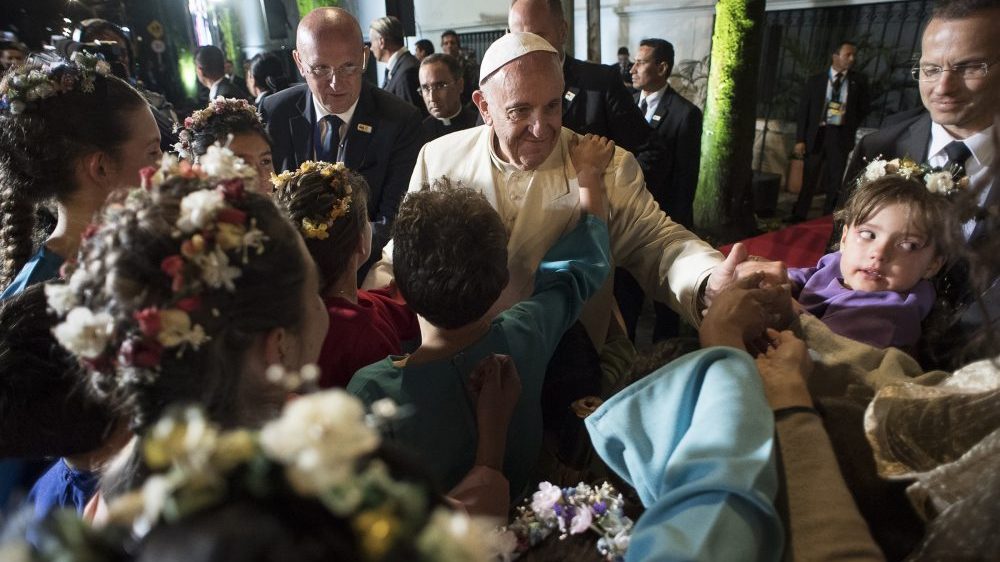Make positive contributions to heal society wounded by violence
Turning to the testimonies given, the Pope said he was moved when listening to them, because they are stories that speak of pain and suffering, “but also, and above all, they are stories of love and forgiveness that speak to us of life and hope; stories of not letting hatred, vengeance or pain take control of our hearts.”
Sep 15, 2017

By Elise Harris
Turning to the testimonies given, the Pope said he was moved when listening to them, because they are stories that speak of pain and suffering, “but also, and above all, they are stories of love and forgiveness that speak to us of life and hope; stories of not letting hatred, vengeance or pain take control of our hearts.”
“Thank you, Lord, for the witness of those who inflicted suffering and who ask for forgiveness; for the witness of those who suffered unjustly and who forgive,” he said, adding that “this is only possible with your help and presence.”
Francis recalled how in her testimony, Mira Garcia had said that she wanted to place her suffering and that of all victims of the conflict at the feet of Christ Crucified, “so that united to his suffering, it may be transformed into blessing and forgiveness so as to break the cycle of violence that has reigned over Colombia.”
“And you, dear Pastora, and so many others like you, have shown us that this is possible,” he said, adding that “with the help of Christ alive in the midst of the community, it is possible to conquer hatred, it is possible to conquer death and it is possible to begin again and usher in a new Colombia.”
Noting how in her testimony Luz Dary shared that the wounds in her heart were deeper and harder to heal than the ones that scarred her body, he acknowledged that this is true, and commended her for realizing that “it is not possible to live with resentment, but only with a love that liberates and builds.”
By going out of herself to help other victims heal and rebuild their lives, Dary found the peace and serenity needed to keep going, he said. And while physical wounds remain, “your spiritual gait is fast and steady, because you think of others and want to help them.”
Turning to Deisy and Juan Carlos, the former FARC and AUC fighters, Pope Francis said their testimony helps one to understand that they, too, are victims.
“In the end, in one way or another, we too are victims, innocent or guilty, but all victims,” he said. “We are all united in this loss of humanity that means violence and death.”
“There is also hope for those who did wrong; all is not lost,” he said, noting that while justice requires that those who do wrong “undergo moral and spiritual renewal,” we must all “make a positive contribution to healing our society that has been wounded by violence.”
Truth and justice, essential in building peace
Francis recognised that it might be hard to believe change is possible given the sheer amount of suffering and violence perpetrated by those pursuing their own agenda. However, “even when conflicts, violence and feelings of vengeance remain, may we not prevent justice and mercy from embracing Colombia’s painful history,” he said.
“Let us heal that pain and welcome every person who has committed offenses, who admits their failures, is repentant and truly wants to make reparation, thus contributing to the building of a new order where justice and peace shine forth.”
As part of the reconciliation process, “it is also indispensable to come to terms with the truth.” This, he said, “is a great challenge, but a necessary one,” because “truth is an inseparable companion of justice and mercy.”
Both truth and justice are essential in building peace, he said, explaining that each prevents the other from being manipulated and transformed into “instruments of revenge against the weakest.”
Truth, the Pope said, “means telling families torn apart by pain what happened to their missing relatives,” and “confessing what happened to minors recruited by violent people.” It also means “recognizing the pain of women who are victims of violence and abuse.”
Pope Francis closed his address offering his perspective as “a brother and a father,” telling Colombia to “open your heart as the People of God and be reconciled. Fear neither the truth nor justice.”
“Do not be afraid of asking for forgiveness and offering it. Do not resist that reconciliation which allows you to draw near and encounter one another as brothers and sisters, and surmount enmity,” he said.
“Now is the time to heal wounds, to build bridges, to overcome differences. It is time to defuse hatred, to renounce vengeance, and to open yourselves to a coexistence founded on justice, truth, and the creation of a genuine culture of fraternal encounter.”
Francis then led attendees in a prayer for peace to the “Christ of Bojayá,” in “Lord, make me an instrument of your peace,” a 20th century prayer which is often attributed to St. Francis of Assisi, and in the Hail Mary. Before departing, the Pope blessed all present.--CNA







Total Comments:0